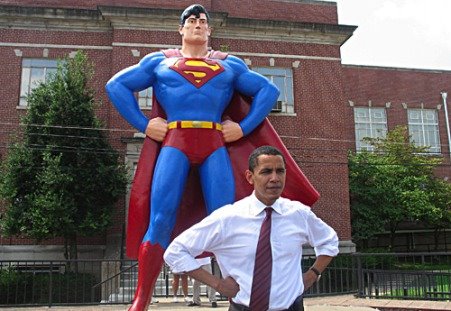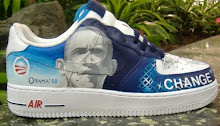We're happy to offer another guest post, this time from Tunji Lardner, a Nigerian journalist who lives in New York. Here, Lardner explores Obama's otherness that SemiObama has tried to chronicle these past several months.
BARACK OBAMA: White man’s dilemma.
Tunji Lardner
Barack Obama. “That one” as Senator John McCain so infamously described Barack Obama in their third televised presidential debate to the glee and horror of millions of US viewers was yet another poignant punctuation mark in the racial dialogue of the ever evolving grand American narrative. But I missed it. As a non-native viewer, my initial response was to chalk up the remark to McCain being “McCain,” a crusty old curmudgeon given by turns to periodic outbursts and a mischievous disarming charm.
It was in the inevitable post debate deconstruction by TV pundits that the covet allusions were exposed, “that one” was variously interpreted to be everything from a common “Irish” expression to a subtle, condescending racist slur that most Americans, especially African-Americans would understand. Like most things, the truth must surely lie somewhere in between, and it a measure of just how ubiquitous and invidious the issue of race is in America-and even more so in this extraordinary elections-that in every word might lie a spring loaded racist pun.
It is almost clichéd to talk about race and racism in America. This artificial social construct is so embedded in the collective psyche and spirit of America, that is difficult not to preface every conversation about equality in America without the periodic listening in of the ambient humming of race, whispering its discordant tune. For non-white immigrants whose ears have not been trained to hear those racialist notes, it takes quite a while to be able to actually “hear” that ambient anthem of racism.
But over time, one hears, one sees and one actually begins to understand the covert drivers that define the issue of race in America. One such moment of clarity for me came when I watched the September Republican Convention a week after the Democrats held theirs in late August. The experience for me was like night and day, black and white, if you will. The grand theatre of a Barack Obama addressing a rainbow nation of Americans promising hope and change was a startling sight, because the implicit sense of possibility was that this man, okay, “this black man” could one day be the President of the United States of America ( POTUS). The very idea of “a black man” as arguably the most powerful human on the planet requires a cosmic recalibration and attitudinal adjustment that might be beyond the capacity of many Americans, black and white.
During the television broadcast of the aforementioned Republican Convention I sat with the rapt attention of a political neophyte new to the ways of American electoral politics. I watched the TV screen intently, trying to decipher why this other party seemed so distant from the values espoused just some days before. As speaker after speaker extolled the war time heroics of John McCain, while simultaneously deriding and mocking the perceived histrionics of Barack Obama, to the rapturous applause of an agitated sea of blanched faces, save the odd speckling of black, it suddenly hit me. In the waves and waves of party faithful, the so-called rock solid republican base, “the true face(s) of America,” the “Joe the plumber” and his archetypes, I saw something that I instantly recognized. It was something that periodically confronts and confounds us, something unsettling, deeply unsettling and troubling, something called fear.
In the faces of this group of white men, and in heeding my own caveat I hasten to add “not all white men,” I saw and fully recognized that primal surge of uncertainty about tomorrow. A feeling that I have grown familiar with for all together different reasons, but a feeling nonetheless about a novel tomorrow, with the possibility of a black man as POTUS. Even as each one swaddled in the familiar comfort of the red white and blue, must respectively confront the fear and loathing of the inevitability of change, the more concrete reality of a busted economy signaling hard times ahead, two enervating wars, the decline of American global status, begs a response.
But what, how do you respond to the unprecedented ascendancy of a very gifted American politician who clearly represents a different and new way forward, but who just happens to be black? Barack Obama’s unbearable blackness of being is at once the denouement of the grand American narrative; the plodding but inevitable fulfillment of these opening words penned with remarkable prescience on July 4, 1776 by group of very wise white men, “We hold these truths to be self-evident, that all men are created equal, that they are endowed by their Creator with certain unalienable Rights, that among these are Life, Liberty and the pursuit of Happiness.”
In rising to collectively fulfill the sacrament of it independence, America through the election of Barack Obama as President has once again displayed its “exceptionalism” and advanced the cause of humankind by providing the world with a transcendent and transformational figure that immediately challenges all the negative and divisive “isms” of our times. A Barack Obama as POTUS has an aspirational doppelganger almost literally as leader of the world in this new century. Tough assignment to be sure, but anyone who has over the last two years of his campaign discerned his preternatural self possession, calmness, and steely determination to change the world for the better can make a safe bet that at the very least he would be a much better improvement on George Bush.
But what about those hold outs, those mostly white men and some women who can’t possibly conceive of an America in which to put it bluntly, the President is a black man?
To them I paraphrase French romanticist Victor Hugo when he said, “ No army can stop an idea whose time has come.” Before the historic elections of last Tuesday there was the speculative notion that win or lose a “Barack Obama” was an idea whose time had come, and that America could and would never be the same again.
Well, the Barack Obama hypothesis is no longer an idea. It is reality. Specifically, it is “the new reality” roundly endorsed by most Americans and enthusiastically supported by the rest of the world. Judging by the unprecedented global out pouring of support for President-elect Barack Obama, it is clear that world transcendently understands the semiotics of a new type of leader for the 21st century. While some might suggest rather churlishly, that it represents the wholesale repudiation at least for now, of leadership of a certain, well, complexion, in a certain sense it is really a Darwinian re-calculation of global demographics and even democratic representation. In America proper, it presages the changing demographics of the country, suggesting that another so called “minority” president might not be such a novelty in another generation, because the old majority would by then be a “minority.” Brack Obama’s colorful heritage, being neither black nor white has finally offered the world a new color spectrum of possibilities in which white is just but one of the many colors available.
And more importantly for America, it has dislodged or even quite possibly displaced the dominant monochromic view of who is a real “American.”Americans, all Americans can now legitimately challenge that pharaonic sense of implicit entitlement and accomplishment that some white men have about their place in the America, the world and indeed the universe.
The huddled undifferentiated masses of “minorities and women,” can now begin to emerge from the shadows to challenge and hold America to the word of the founding fathers’ self evident truths. In 1831 when another French man, Alexis de Tocqueville writing about democracy in America, made the case for America’s exceptionalism. It was by one interpretation to underscore the difference and put some distance between the evolving American New World ideals and the staid European Old World views it had left behind.
In other interpretations and especially when conflated with the concept of a “manifest destiny,” even as it connotes the contentious acquisition of vast tracts land across the North American continent, it provided a unique sense of superiority and dominion over and above all others. From the right to own slaves to key elements of the Bush doctrine-the right to globally spread democratic values, as well as to preemptively strike at America’s perceived enemies, with the unilateral swagger that has mired America in Iraq, all these elements brewing in a four hundred year old melting pot have come to head with this election.
The American story is about to be re-written and the new chapters will be a more inclusive narrative that does not portray the white man as the protagonist that dominates every story line, even when not there. E PLURIBUS UNUM; out of the many shall indeed come one, one American grand narrative. In coming full circle to one, “that one” or “the one,” or “this one” or “the other” the collective reality of today is that we all live in an increasingly interdependent and delicately balanced world, in which there really is no “other.”
The White man’s dilemma is that in the days and weeks and years following Tuesday, in gazing at the mirror he will either see his true reflection as being wholly part of “us” or choose to believe the refraction of his distorted identity as being separate and different from the rest of America. Whichever way, America will march toward hope and change; with the righteous wind behind her the laggards will have to catch up, hopefully soon.





















